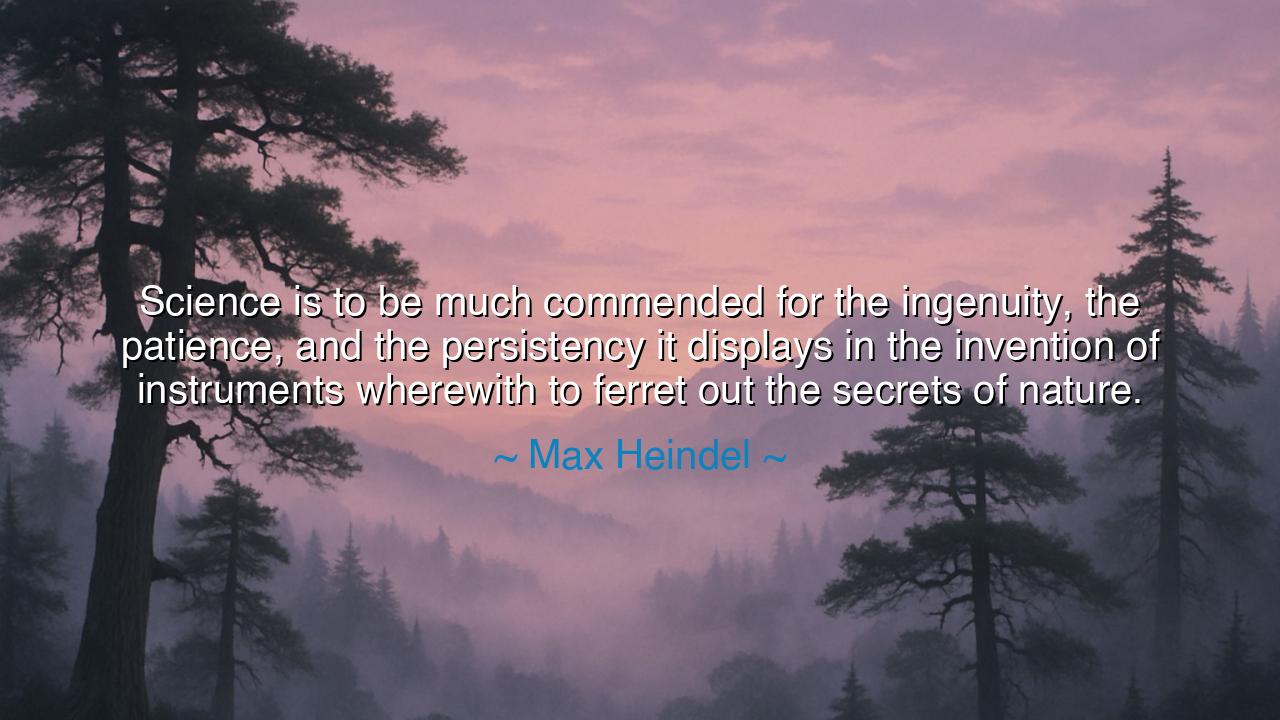
Science is to be much commended for the ingenuity, the patience
Science is to be much commended for the ingenuity, the patience, and the persistency it displays in the invention of instruments wherewith to ferret out the secrets of nature.






The mystic Max Heindel, in his profound words, declares: “Science is to be much commended for the ingenuity, the patience, and the persistency it displays in the invention of instruments wherewith to ferret out the secrets of nature.” This saying is not merely an observation, but a hymn to human striving, a recognition of the sacred labor of mankind as it seeks to penetrate the veil of mystery that has, since the dawn of time, enshrouded the cosmos. Heindel, a spiritual philosopher of the early twentieth century, perceived that the work of science is not cold or mechanical, but infused with the fiery spirit of discovery, persistence, and reverence for truth.
Consider first the word ingenuity, which signifies the divine spark within the human mind. From the bow and arrow of the hunter, to the telescope of Galileo, ingenuity is the flame that illuminates the darkness of ignorance. It is the power to create that which did not exist before, to bridge the gap between what is seen and what is yet unseen. Without this gift, the secrets of the heavens would remain forever hidden, like jewels buried deep in the earth. Heindel honors this power because it is the very instrument through which man reveals himself as more than a creature of instinct—he is a seeker, an inventor, a mirror of the cosmic intelligence.
Yet ingenuity alone is not enough. Heindel praises also the patience of science, for truth does not yield herself to the hasty or the arrogant. Just as the farmer must wait for the seed to ripen in the season appointed, so must the scientist wait for the fruits of observation, trial, and error. The patient hand records data for decades, even generations, before conclusions are drawn. Here lies the humility of true knowledge, for nature does not surrender her mysteries to the impatient; she tests the worthiness of those who seek her. This patience becomes a lesson to all mortals, reminding us that wisdom is not seized in a single grasp but cultivated through time, discipline, and endurance.
Alongside patience stands the heroic virtue of persistency. Many a discovery has been purchased only through failure upon failure. The great Thomas Edison, when striving to perfect the electric lamp, is said to have tried thousands of materials before success came at last. To the weak heart, such repeated disappointments would bring despair, but to the persistent spirit, they are but stepping stones to triumph. Heindel, with the eyes of a seer, recognized in this tenacity the very essence of mankind’s ascent—the refusal to be defeated by the barriers that guard the hidden gates of knowledge.
A shining example lies in the tale of Galileo Galilei. With his crude telescope, fashioned by the ingenuity of his hands, he gazed upon the heavens. He saw moons circling Jupiter, mountains upon the Moon, and the phases of Venus—evidence that shook the foundations of an age-old worldview. For this, he endured mockery, trial, and confinement. Yet his vision could not be undone, for truth once seen cannot be un-seen. His story is a monument to the persistence of science: though men may chain the body, the flame of discovery burns unquenchable.
Heindel’s praise of science is thus more than flattery; it is a recognition that the human spirit itself, in its higher aspect, is scientific. To seek truth through instrument and experiment is akin to the soul seeking the divine through meditation and prayer. Both are ways of unveiling reality, and both demand ingenuity, patience, and persistence. The telescope and the microscope are as holy in their way as the rosary or the altar, for through them the eternal mysteries are revealed to the earnest seeker.
The lesson for us is clear: in our daily lives, let us cultivate these same virtues. Let us bring ingenuity to our tasks, refusing to be bound by stale methods when creativity can open new paths. Let us practice patience, not expecting fruits before their time, but trusting in the long harvest of steady effort. Let us embody persistence, never surrendering when obstacles loom before us, but pressing on with unshakable determination. For whether we labor in science, in art, or in the inner work of the soul, these are the keys that unlock the doors of destiny.
Therefore, O children of the future, remember Heindel’s words and take them to heart. When you next falter in your journey, recall the patience of the farmer, the persistence of Edison, the courage of Galileo. Let your own life become a living experiment in truth-seeking, and through ingenuity, patience, and persistence, you too shall ferret out the secrets not only of nature, but of your own immortal being.






AAdministratorAdministrator
Welcome, honored guests. Please leave a comment, we will respond soon